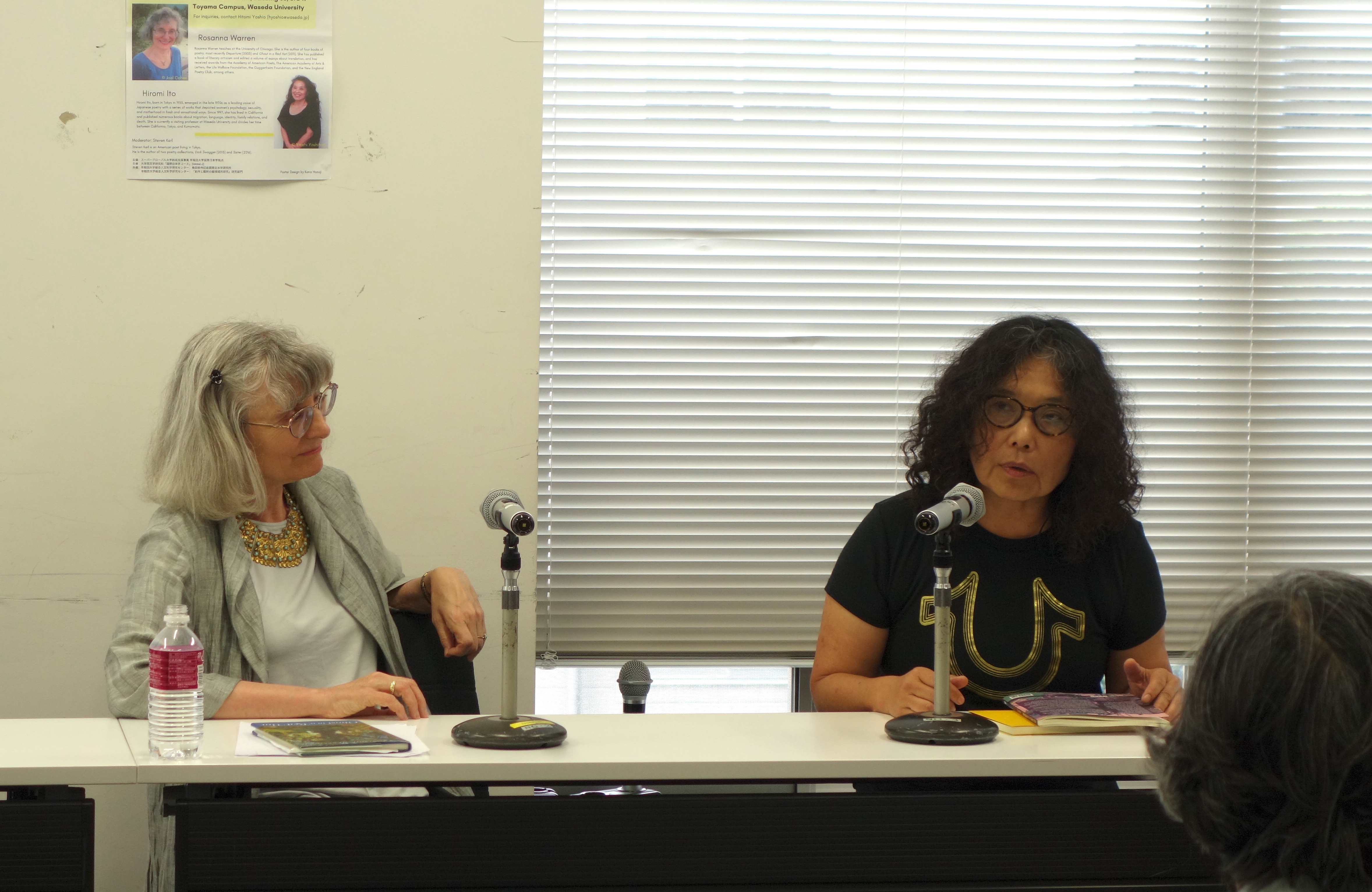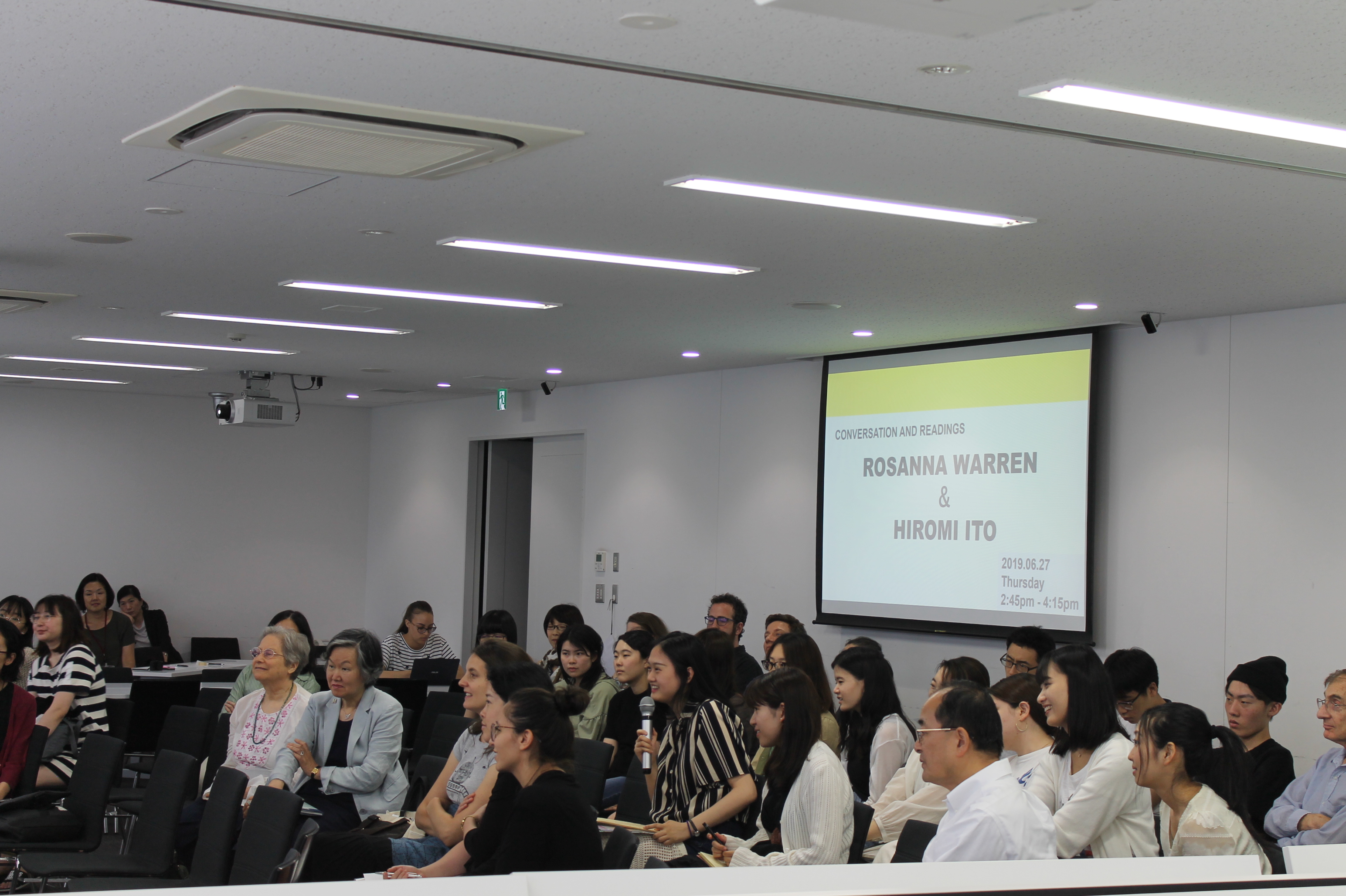Conversation and Readings: Rosanna Warren & Hiromi Ito
Waseda welcomed award-winning and accomplished poets Rosanna Warren and Hiromi Ito for a discussion of their work on June 27, 2019. Entitled “Conversation and Readings: Rosanna Warren & Hiromi Ito,” the event was moderated by poet and Waseda lecturer Steven Karl, who delivered a short introductory address to attendees before turning the floor over to Ito and Warren.

The titular conversation and readings began first with the reading portion of the event. Warren opened this segment with a series of readings of poems from her book Ghost in a Red Hat, as well as from her new manuscript including “Cotillion Photo,” “For Chiara,” and “That the Earth is Suspended”. The readings were interspersed with explanations of her poetry’s various backstories and inspirations, from pre-Socratic philosophy to her daughter’s work as a social worker.
Ito continued the session, speaking briefly on the subject matter of her book Wild Grass on the Riverbank, its basis in Japanese medieval stories and its relation to her life experiences as a transnational migrant, and performing a number of readings selected from the book. An interview-based discussion then followed, facilitated by Karl.

When asked if either of them had known from an early age that they wanted to write poetry, Ito responded that she realized she wanted to be a poet around the age of 15. Warren replied that she initially thought to become a painter, although writing had always been important to her. She went on to say that since childhood she had perceived writing and painting to be somehow connected as a method of interacting with various perceptions of reality.
The conversation later shifted to the subject of translation and why Warren and Ito consider translation to be such important work. Ito said that she thinks of translation as a method to link oneself with a larger network of authors that you would otherwise not have access to. She spoke about her relationship with her own various translators, and the excitement and freedom that translations invite into the interpretation of her work. Warren continued that when she translates, she puts herself in a “trans-like state” that allows her to be permeable to other forces. She also enjoys working with her French translator, Aude Pivin, because translation activates a deeper understanding of French as a language. In particular, she described a “poem” as an echo chamber of all works that came before it, with characteristics that may not come through in translation to readers without certain historical and cultural background knowledge.
The conversation then shifted to publishing and literary communities. Karl posed a question directly to Ito concerning Japanese poetry, and her feelings on whether its climate is still as conservative as it had been in the past. Ito’s opinion was that Japanese poetry had become progressive to an extent before sliding backward into a certain degree of conservatism, although she feels that the pendulum is swinging the opposite way again.

Questions from the audience were then taken. The first question related to the guest speakers’ attitudes toward social media. Ito answered that she simply used social media because it is effective–if she is appearing in an event, she can post about it on Twitter and that information is then disseminated to thousands of people. Warren said that she actively disassociates herself with social media, although all technologies can certainly be used by artists, and that everything depends on the specific intelligence of the person using it.
An audience member referred to Warren’s previous comment and asked where the line lay between herself and her fiction. Warren explained that what she means by “reality” is not the journalistic aspects of life but the deeper structures of reality, the psychic and emotional realities. The question for the artist, then, is how to arrive at these deeper truths filtered through Imaginative structures. Warren then described her forthcoming book, to be released in 2020, as a kind of autobiographical fiction that is concerned with larger ethical matters including our relation to suffering and the suffering of others.
On the topic of contemporary Japanese poetry and its tendency to focus on the internal self, Ito was asked how she personally used her own self in her poetry in relation to the external world. Ito answered that anything you feel strange about has the possibility of being considered as “external” – being an immigrant in the U.S. or even being in Japan as a Japanese – that creates an exciting tension with the internal. What is important for poets is to ask the question of how we can destroy language and further our boundaries, rather than being caught up in the negative politics of poetry communities.
Following the Q&A session, the two guest speakers welcomed attendees to share informal conversations as the event came to a close.

Event Overview
Conversation and Readings: Rosanna Warren & Hiromi Ito
Event Date & Time: June 27, 2019, 2:45pm-4:15pm
Location: Toyama Campus, Waseda University, Building 33, 3rd Floor, Conference Room 1
Speakers:
Rosanna Warren (Professor, University of Chicago)
Hiromi Ito (Professor, Waseda University)
Moderator: Steven Karl (Adjunct Researcher, Research Institute for Letters, Arts and Sciences, Waseda University)
Organizer: Hitomi Yoshio (Associate Professor, Faculty of Letters, Arts and Sciences, Waseda University)
Audience: Students, Faculty Members, the Public
Sponsors:
Top Global University Global Japanese Studies Model Unit, Waseda University
Global Japanese Literary and Cultural Studies in Graduate School of Letters, Arts and Sciences, Waseda University (Global-J)
Co-Sponsors:
Research Institute for Letters, Arts and Sciences, Waseda University
Ryusaku Tsunoda Center of Japanese Culture, Transdisciplinary Research for Creative Writing and Translation


